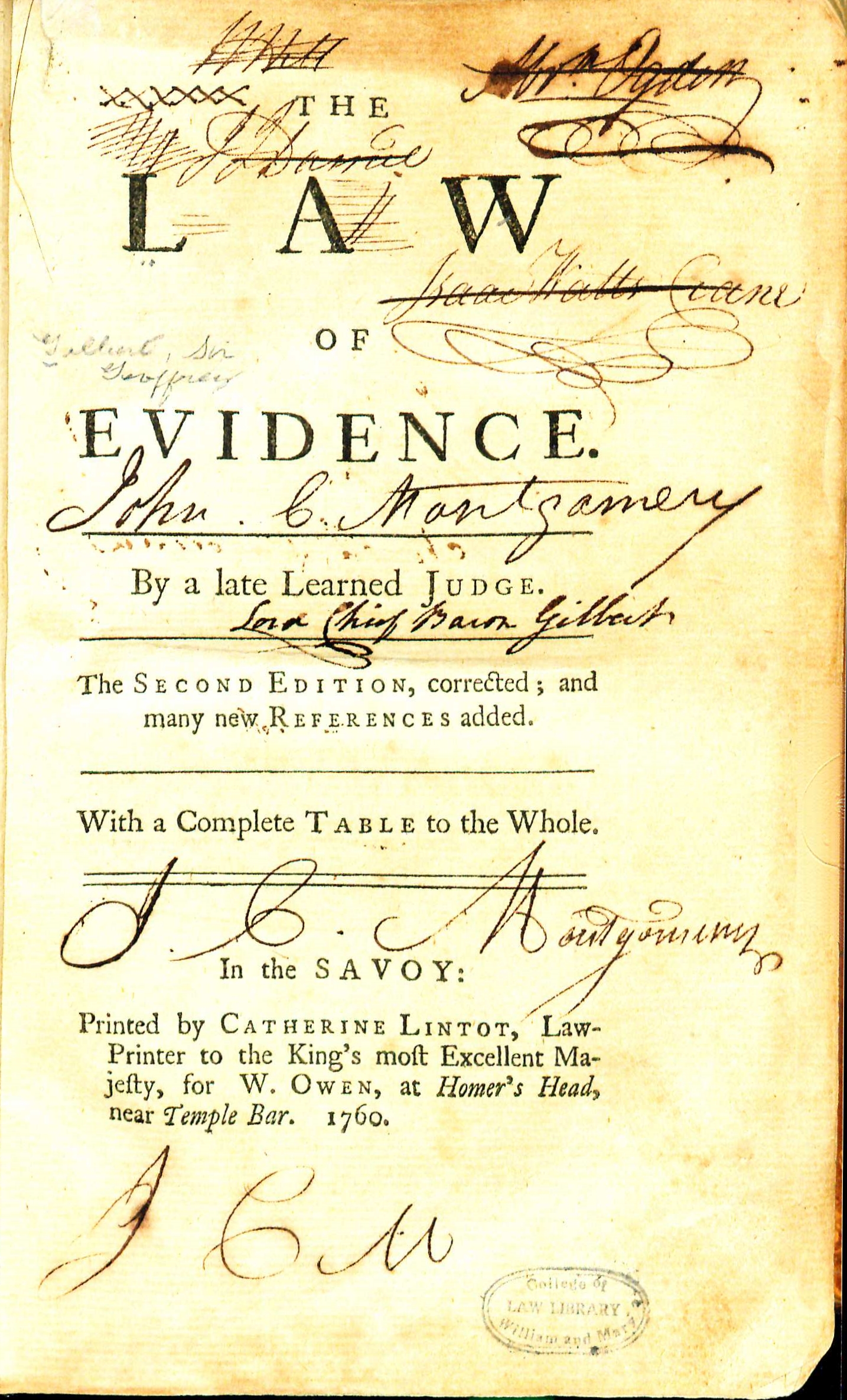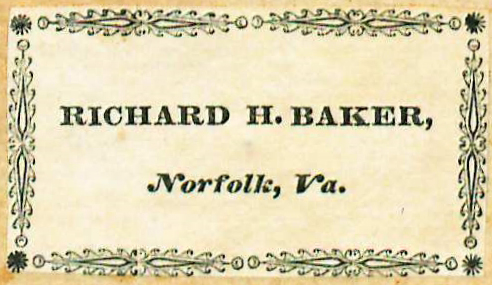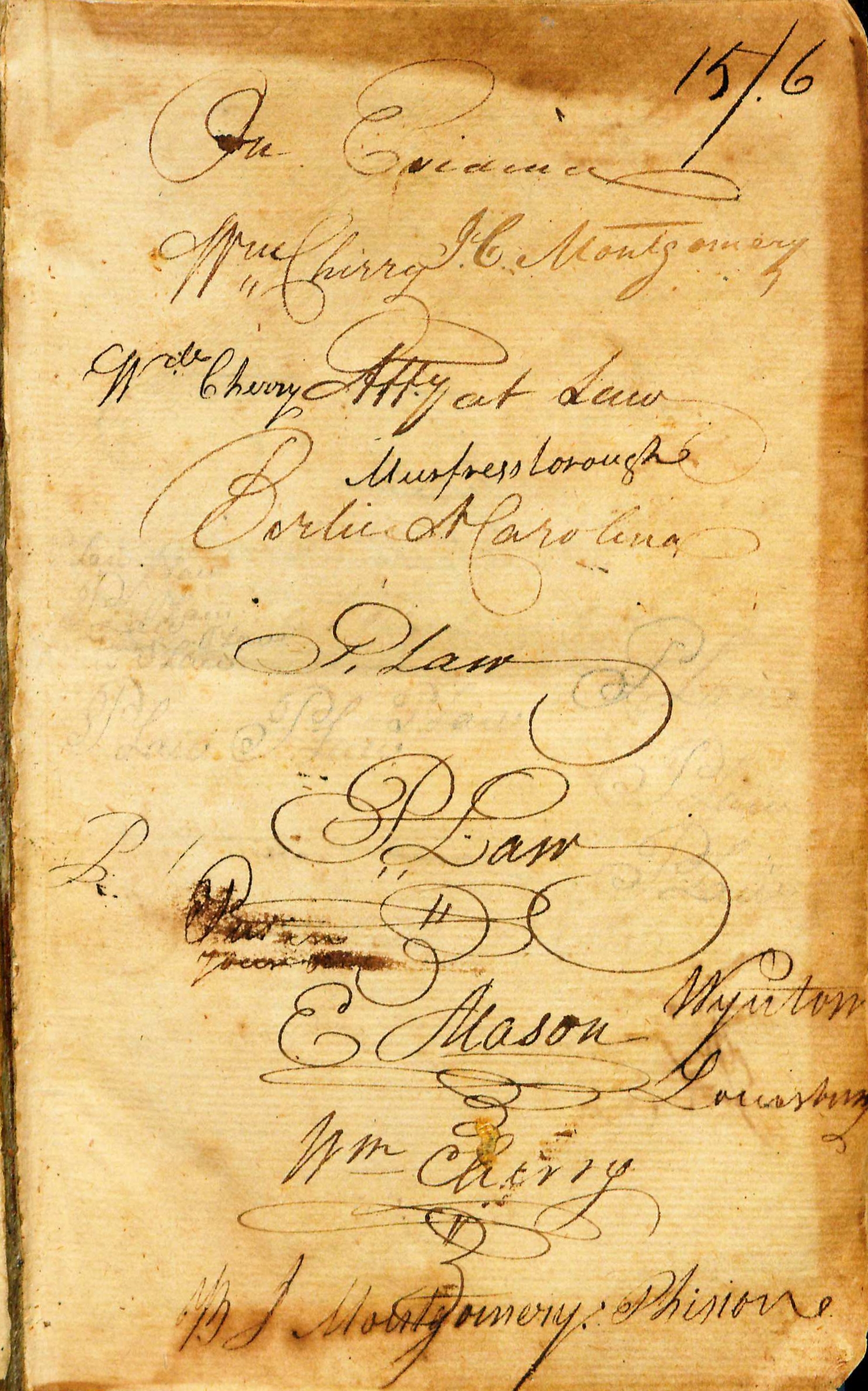The Law of Evidence
by Geoffrey Gilbert
| The Law of Evidence | |
|
Title page from The Law of Evidence, George Wythe Collection, Wolf Law Library, College of William & Mary. | |
| Author | Geoffrey Gilbert |
| Published | London, In the Savoy: Printed by Catherine Lintot ... for W. Owen |
| Date | 1760 |
| Edition | Second |
| Language | English |
| Pages | 289, 75 |
| Desc. | 4to (22 cm.) |
| Location | Shelf F-3 |
Geoffrey Gilbert (sometimes Jeffray or Jeffrey Gilbert) (1674-1726) was admitted to Inner Temple in 1662 and joined the bar in 1668. He became Chief Baron of the Irish Exchequer in 1715 and rose to the position of Chief Baron of exchequer of England in 1725.[1]
As a lawyer and judge, Gilbert had an esteemed reputation, but his decisions were not widely reported or cited. Posthumously Gilbert has been better regarded for his engagement in a general treatise on English law in the 'Institutional' model. It was separated into sections of "Persons," "Things," and "Actions," the text of which was likely meant for publication.[2]
While the collection involved at least two other contributors, Gilbert was instrumental in the structure, writing of text, and editing of others’ contributions. However, Gilbert discontinued the project before 1710 and, ultimately, the sections were not published as a collection. Gilbert left some of his manuscripts in Ireland, while twelve other sections were published fragmentally as individual treatises from 1730-1763.[3]
The section, "Evidence," was already in circulation as an individual, albeit unpublished, manuscript in 1710 and is cited as Gilbert’s most known and influential work. Publication of the section, as The Law of Evidence, occurred in 1754. The treatise was expanded and republished in six more editions, significantly impacting evidence law into the mid nineteenth century. It was acclaimed by Blackstone as "a work which it is impossible to abstract or abridge without losing some beauty and destroying the chain of the whole."[4] Gilbert’s Law of Evidence is noted for distinguishing between written and unwritten forms of evidence, which were enveloped in his principle of “the best evidence rule”.[5] The premise of Gilbert’s principle is that secondary documentation will not be acceptable evidence when the preferred, original document is available.
Gilbert’s writings are indicative of Whig interpretations of law during the early eighteenth century, as well as the development of the modern, legal treatise. However, the nature of publication has led some to question attribution of Evidence and other sections of the treatise to Gilbert.[6]
Evidence for Inclusion in Wythe's Library
Brown's Bibliography[7] lists the second edition (1760) of this title based on entries in the manuscript version of John Marshall's law notes. Brown also notes that Wythe cited Gilbert's Law of Evidence (multiple times) in his second argument for the plaintiff in Bolling v. Bolling.[8] The Wolf Law Library followed Brown's suggestion, and purchased a copy of the 1760 edition.
Description of the Wolf Law Library's copy
Bound in recent limp vellum.
Images of the library's copy of this book are available on Flickr. View the record for this book in William & Mary's online catalog.
See also
- George Wythe Room
- The Law of Devises, Revocations, and Last Wills
- The Law of Uses and Trusts
- The History and Practice of the High Court of Chancery
- Reports of Cases in Equity
- Wythe's Library
References
- ↑ M. McNair, "Gilbert, Sir Jeffray (1674–1726)," Oxford Dictionary of National Biography (Oxford University Press, 2004- ), accessed April 20, 2015.
- ↑ Ibid.
- ↑ Ibid.
- ↑ William Blackstone, Commentaries on the Laws of England (Oxford : Printed at the Clarendon Press, 1768), 3:367.
- ↑ John H. Langbein, "Historical Foundations of the Law of Evidence: A View from the Ryder Sources," Columbia Law Review 96, no. 5 (1996): 1172-1173.
- ↑ M. McNair, "Gilbert, Sir Jeffray (1674–1726)."
- ↑ Bennie Brown, "The Library of George Wythe of Williamsburg and Richmond," (unpublished manuscript, May, 2012, rev. May, 2014) Microsoft Word file. Earlier edition available at: https://digitalarchive.wm.edu/handle/10288/13433
- ↑ Thomas Jefferson and Bolling v. Bolling: Law and the Legal Profession in Pres-Revolutionary America ed. Bernard Schwartz, Barbara Wilcie Kern, R. B. Bernstein (San Marino, CA: The Huntingdon Library; New York: New York University School of Law, 1997), 294-298.


